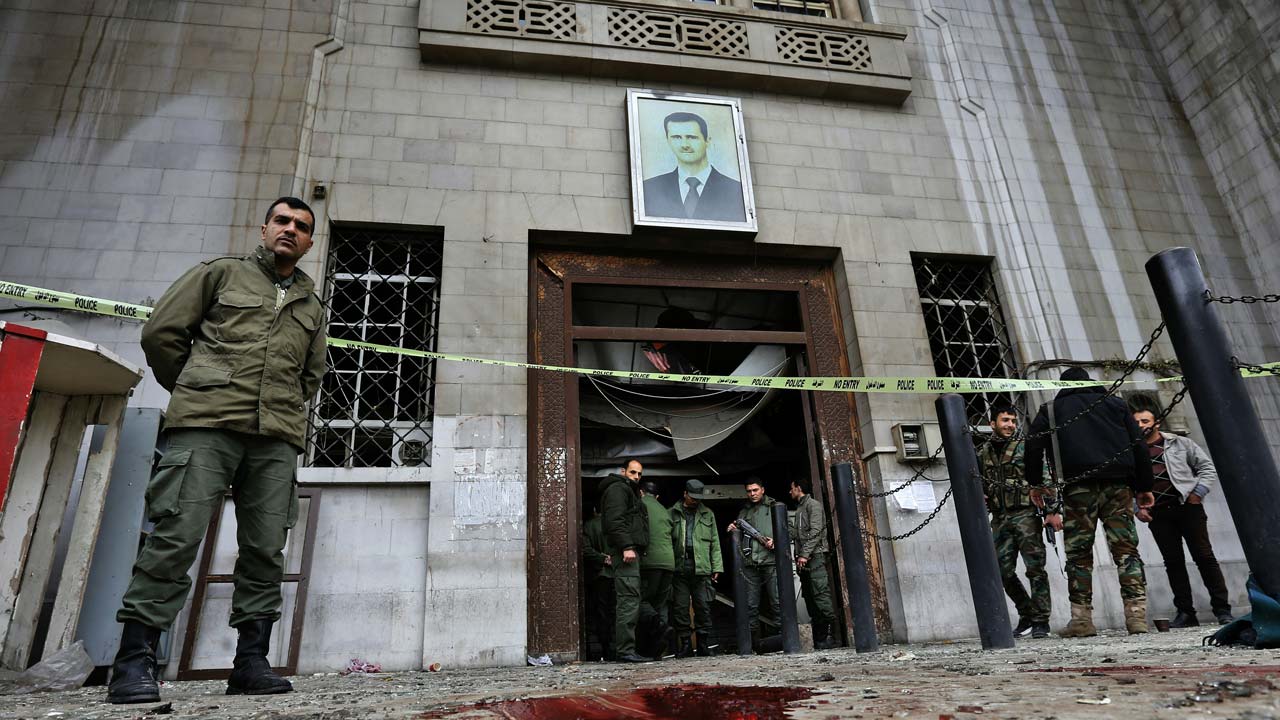
Louai Beshara / AFP
In northern Syria, 14 children were among 21 people killed in an air strike on Idlib city, a monitor said.
There was no immediate claim of responsibility for the blasts, the second wave of deadly attacks in the capital in less than a week, after twin bombings Saturday that killed 74 people.
Wednesday’s first attack saw a suicide bomber rush inside the building and blow himself up when police tried to prevent him from entering the courthouse in the centre of Damascus, state media reported.
A police source told AFP that 32 people were killed and 100 wounded.
“I heard a commotion and looked to my left and I saw a man in a military vest,” a man with a bandage over his eye told state television after the attack.
“He had his hands up and screamed ‘God is greatest’ and then the blast happened,” he added.
State television broadcast images from inside the courthouse, showing blood splattered across the ceiling and smeared across the marble floor of the lobby, with a portrait of President Bashar al-Assad still intact and hanging above.
– Streets deserted –
The second blast hit a restaurant in the city’s western Rabweh district less than two hours later, and injured 25 people, the police source said.
State media said the bomber had ducked into the restaurant after being chased by security services.
In the wake of the attacks, AFP correspondents in the city said the streets were deserted, with some roads blocked off by security services.
The bloodshed also continued elsewhere in the country, with 21 people including 14 children killed in an air strike in Idlib city in northwestern Syria, according to the Syrian Observatory for Human Rights.
The Britain-based monitor said the strike, which is controlled by jihadists and their Islamist allies, were believed to have been carried out by Russian warplanes.
The Observatory, which relies on a network of sources inside Syria for its information, says it determines whose planes carry out raids according to type, location, flight patterns and munitions used.
More than 320,000 people have been killed in Syria since the conflict began in March 2011, with Assad’s government now holding the upper hand in the bloody war and rebel forces increasingly divided and dispirited.
In recent months, the opposition has suffered a series of reversals, including being forced from their one-time stronghold of east Aleppo in December.
And peace talks have made little progress towards resolving the conflict, with rebels declining to even attend a latest round of negotiations in Kazakhstan which wrapped up Wednesday.
The conflict began in 2011 with peaceful demonstrations inspired by similar movements during the so-called “Arab Spring”, calling on Assad to implement reforms.
They were put down violently, prompting demonstrators to pick up weapons as the uprising spiralled into a complex, brutal civil war.
– ‘Savage horror’ –
Rebel forces initially captured large parts of the country and several key cities, and won support from international backers including Washington, Turkey and the Gulf states.
But the Islamic State jihadist group emerged from the chaos to seize control of significant territory in Syria and neighbouring Iraq.
And in September 2015, government ally Russia began a military intervention in support of Assad, helping his forces regain much of the ground they had lost.
Under pressure from air strikes by a US-led coalition, IS has also retreated to bastions like its de facto Syrian capital Raqa.
On Wednesday, Aleppo residents said water was gradually being restored after months of cuts after IS was expelled from a local pumping station.
The opposition’s backers have dialled back support, with Turkey now working alongside Russia on peace talks, and US President Donald Trump’s administration has backed away from the conflict.
The war’s brutality has provoked international outcry, with the UN’s rights chief Zeid Ra’ad Al Hussein this week describing Syria as “a place of savage horror and absolute injustice.”
UN Secretary General Antonio Guterres on Wednesday urged adherence to a ceasefire brokered by Russia and Turkey in December, and progress towards peace, which he called “a moral and political imperative both for the Syrian people and for the world.”
Peace is something that ordinary Syrians, including many who supported the uprising, are desperate for.
“When we began to demonstrate, I never thought it would come to this. We thought it would end in two, three months, a year at most,” Abdallah al-Hussein, a 32-year-old footballer from the town of Saraqeb in Idlib province, told AFP.
“Whether this war is ended with weapons or peacefully doesn’t matter. People want to live in peace.”
[ad unit=2]



